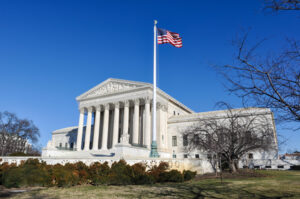Supreme Court Ruling on Inherited IRAs
Just a few months ago, in June 2014, the Supreme Court ruled inherited Individual Retirement Accounts (IRAs) are not protected from the beneficiary’s creditors, because there are key differences between an inherited IRA and an IRA that you set up and fund yourself. The verdict of Clark v. Rameker will dramatically affect the way many Americans approach their IRAs within their estate plans. Since funds in an inherited IRA aren’t protected from bankruptcy, what other options do you have if you want to protect your IRA from your beneficiary’s creditors? Today we’re going to discuss the Supreme Court ruling on inherited IRAs, its impact on estate planning, and why you might be interested in creating an IRA trust instead.

The Supreme Court Ruling on Inherited IRAs
CLARK V. RAMEKER
In 2001, Heidi Heffron-Clark inherited an IRA from her mother. Nine years later, when she and her husband filed for bankruptcy, they claimed the inherited IRA to be exempt from their bankruptcy estate under 11 U.S.C. §522(b)(3)(c). However, the bankruptcy trustee and unsecured creditors disagreed and objected Clark’s claim. The Supreme Court issued their judgment for Clark v. Rameker on June 14, 2014. They affirmed the Seventh Circuit’s decision, holding that, “funds held in inherited Individual Retirement Accounts are not ‘retirement funds’ within the meaning of 11 U.S.C. §522(b)(3)(c) and therefore not exempt from the bankruptcy estate.” Click here to read the court’s opinion in its entirety. The Supreme Court ruling on inherited IRAs will greatly impact how people choose to address IRAs within their estate plans. Inherited IRAs and IRAs you set up and fund yourself are now distinctly different in the eyes of the law. How are they different? Well, first, when you inherit an IRA, you cannot invest additional funds in the account. Second, people who inherit IRAs are required to remove money from the account (regardless of how close they are to retirement). Third, people who inherit IRAs are able to withdraw the entire IRA balance at any time and they will not be penalized for it. Although an inherited Individual Retirement Account includes the words “retirement account,” it doesn’t act like one, and thus, it isn’t protected from bankruptcy creditors.
WHAT YOU CAN DO
Keeping the Supreme Court ruling on inherited IRAs in mind, how can you protect your IRA funds from your beneficiary’s creditors? You have two main options. First, if you’re planning to give your IRA to your spouse, you can bestow the account upon your spouse just as you would have before Clark v. Rameker. Then, when your spouse inherits the IRA, they can roll the funds into their own retirement account. A rollover is a great way to erase the difference between an inherited IRA and a personal IRA. However, if your spouse doesn’t roll the funds, the IRA will still be considered an inherited IRA in the eyes of the law (and thus, it won’t be protected during bankruptcy). But what if you and your beneficiary are not spouses? In that case, to get around the Supreme Court ruling on inherited IRAs, consider using an IRA trust. With this solution, you will need to name a trust as the beneficiary of your IRA, not a person. This method has been used for years as a way to protect IRAs from creditors, and now it is additionally beneficial because it allows you to step around the Supreme Court ruling on inherited IRAs. An IRA trust ensures the beneficiary will be able to stretch out the IRA and use it during their own retirement years. To ensure this plan will work, hire an attorney experienced in estate planning so you can ensure the trust will be drafted properly and follow all the pertinent rules and regulations.
– – – – –
If you’re interested in creating an IRA trust to protect your retirement funds, contact the attorneys at LifeGen Law Group. We would be happy to help you better understand the Supreme Court ruling on inherited IRAs and how it might affect your estate plan. Give us a call at 417-823-9898 or click here to schedule a free consultation.
